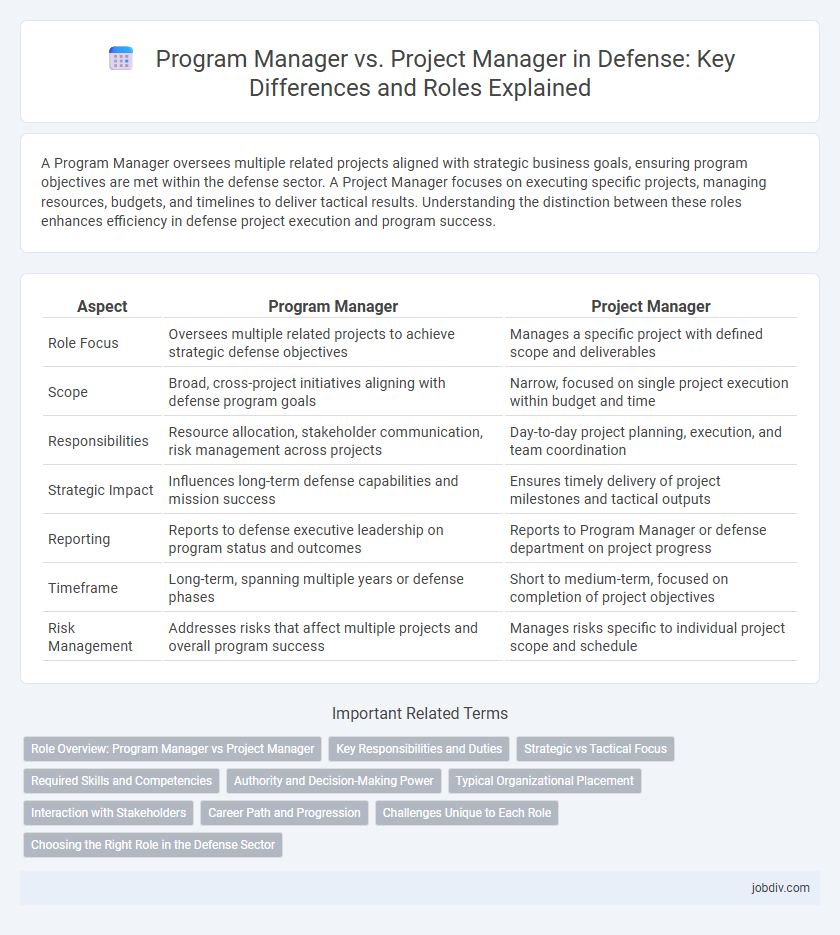A Program Manager oversees multiple related projects aligned with strategic business goals, ensuring program objectives are met within the defense sector. A Project Manager focuses on executing specific projects, managing resources, budgets, and timelines to deliver tactical results. Understanding the distinction between these roles enhances efficiency in defense project execution and program success.
Table of Comparison
| Aspect | Program Manager | Project Manager |
|---|---|---|
| Role Focus | Oversees multiple related projects to achieve strategic defense objectives | Manages a specific project with defined scope and deliverables |
| Scope | Broad, cross-project initiatives aligning with defense program goals | Narrow, focused on single project execution within budget and time |
| Responsibilities | Resource allocation, stakeholder communication, risk management across projects | Day-to-day project planning, execution, and team coordination |
| Strategic Impact | Influences long-term defense capabilities and mission success | Ensures timely delivery of project milestones and tactical outputs |
| Reporting | Reports to defense executive leadership on program status and outcomes | Reports to Program Manager or defense department on project progress |
| Timeframe | Long-term, spanning multiple years or defense phases | Short to medium-term, focused on completion of project objectives |
| Risk Management | Addresses risks that affect multiple projects and overall program success | Manages risks specific to individual project scope and schedule |
Role Overview: Program Manager vs Project Manager
A Program Manager in defense oversees multiple related projects, aligning them with strategic military objectives and ensuring resource optimization across programs. A Project Manager focuses on executing specific defense projects within scope, schedule, and budget constraints, managing day-to-day tasks and team coordination. While Program Managers drive broader mission success and inter-project synergy, Project Managers concentrate on delivering individual project outcomes efficiently.
Key Responsibilities and Duties
Program Managers in defense oversee multiple related projects, ensuring alignment with strategic objectives, resource allocation, and risk management across the entire program lifecycle. Project Managers concentrate on executing specific defense projects, managing schedules, budgets, and team performance to meet defined technical requirements. Both roles require strong leadership and communication skills, but Program Managers focus on broader coordination, while Project Managers handle day-to-day project delivery.
Strategic vs Tactical Focus
A Defense Program Manager oversees multiple projects aligning with long-term strategic military objectives, ensuring resources and efforts support overarching defense capabilities and national security goals. In contrast, a Project Manager concentrates on tactical execution, managing specific tasks, timelines, and deliverables within individual defense projects to meet immediate operational requirements. The Program Manager's focus on strategic integration drives coordinated defense initiatives, while the Project Manager's tactical approach ensures efficient project-level implementation and mission success.
Required Skills and Competencies
Program Managers in defense require strategic leadership, risk management, and stakeholder engagement skills to oversee multiple interrelated projects aligned with broader defense objectives. Project Managers focus on tactical skills such as schedule management, resource allocation, and quality control to deliver specific defense project outcomes on time and within budget. Both roles demand strong communication, problem-solving abilities, and familiarity with defense acquisition regulations and compliance standards.
Authority and Decision-Making Power
Program Managers in defense oversee multiple interrelated projects, holding broader authority to align resources and strategic objectives across the entire program, enabling high-level decision-making that affects overall mission success. Project Managers focus on individual project execution with authority limited to budget, schedule, and scope within their specific project, making tactical decisions to meet defined project goals. The Program Manager's authority encompasses coordination among project managers and stakeholders, facilitating integrated solutions critical in complex defense environments.
Typical Organizational Placement
In defense organizations, a Program Manager typically reports to a senior executive within the acquisition or portfolio management office, overseeing multiple related projects to ensure strategic alignment and resource optimization. A Project Manager usually operates within specific functional units or project teams, managing day-to-day activities and coordinating technical tasks to meet defined milestones. This hierarchical distinction supports efficient decision-making and accountability across complex defense acquisition programs.
Interaction with Stakeholders
Program Managers in defense coordinate multiple related projects to align with strategic objectives, ensuring comprehensive stakeholder engagement across various levels including government agencies, contractors, and military units. Project Managers focus on specific deliverables, maintaining direct communication with project teams, suppliers, and immediate stakeholders to meet technical and timeline requirements. Effective interaction with stakeholders in defense requires understanding their diverse priorities, regulatory constraints, and ensuring transparent reporting to support mission-critical decisions.
Career Path and Progression
Program Managers in defense oversee multiple interrelated projects, coordinating strategic objectives, resource allocation, and stakeholder engagement to ensure alignment with military goals. Project Managers focus on executing specific defense initiatives, managing timelines, budgets, and team deliverables within defined scopes. Career progression often leads Project Managers to advance into Program Manager roles, leveraging expanded leadership skills and operational oversight to influence broader defense program success.
Challenges Unique to Each Role
Program managers in defense face challenges such as coordinating multiple project teams, aligning strategic objectives with government regulations, and managing large-scale budgets often exceeding billions of dollars. Project managers encounter unique difficulties including meeting strict timelines for individual defense system components, ensuring compliance with detailed technical specifications, and mitigating risks related to specialized defense contractors. Both roles require rigorous stakeholder communication and adaptive problem-solving to navigate the defense sector's complex regulatory and operational environment.
Choosing the Right Role in the Defense Sector
Program Managers in the defense sector oversee multiple interrelated projects, ensuring alignment with strategic military objectives and effective resource allocation across large-scale initiatives. Project Managers focus on executing specific defense projects with defined scope, timelines, and budgets, often managing teams to deliver technical solutions such as weapon systems or cybersecurity upgrades. Choosing the right role depends on the scale and complexity of responsibilities, where Program Managers prioritize integration and long-term strategy, while Project Managers concentrate on tactical execution and immediate deliverables.
Program Manager vs Project Manager Infographic

 jobdiv.com
jobdiv.com